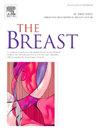Exploring the efficacy of extended endocrine therapy in pure mucinous breast carcinoma
IF 7.9
2区 医学
Q1 OBSTETRICS & GYNECOLOGY
引用次数: 0
Abstract
Background
This study aims to compare the efficacy of 5- versus 10-year endocrine therapy in pure mucinous breast carcinoma (PMBC), focusing on late recurrence and related factors for personalized treatment.
Methods
Patients with PMBC who underwent surgery from 1996 to 2014 at Asan Medical Center were included. Recurrence was categorized as early (<5 years) or late (≥5 years). The primary endpoint was disease-free survival in the 5- and 10- year endocrine groups. Subgroup analysis was performed focused on clinically high-risk patients (tumor ≥2 cm, nodal metastasis, or high histologic grade).
Results
A total of 489 patients with PMBC were identified. During a follow-up time of 126 months, 35 (7.2 %) patients had an early recurrence, 25 (5.1 %) patients had a late recurrence, and 394 (87.7 %) patients had no recurrence. High histologic grade was the only factor significantly correlated to late recurrence (hazard ratio 6.92, 95 % confidence interval 1.53–31.3). Among the 5-year disease-free survivors (N = 416), 340 (81.7 %) and 76 (18.3 %) patients underwent 5-year and 10-year endocrine therapy, respectively. Endocrine therapy duration did not impact the 10-year disease-free survival rate (5-year [95.4 %] vs. 10-year [97.3 %] endocrine therapy, log-rank test p = 0.504). Subgroup analysis with clinically high-risk patients revealed no survival difference based on the endocrine therapy duration, too.
Conclusion
Extended endocrine therapy did not significantly reduce late recurrence in PMBC, even in high-risk groups, underscoring the importance of personalized strategies for sustained outcomes.
探讨单纯黏液性乳腺癌扩大内分泌治疗的疗效
本研究旨在比较单纯黏液性乳腺癌(PMBC) 5年与10年内分泌治疗的疗效,重点关注晚期复发及相关因素的个性化治疗。方法纳入1996 ~ 2014年在峨山医疗中心行手术治疗的PMBC患者。复发分为早期(≥5年)和晚期(≥5年)。主要终点是5年和10年内分泌组的无病生存。亚组分析主要针对临床高危患者(肿瘤≥2 cm、淋巴结转移或高组织学分级)。结果共检出PMBC患者489例。随访126个月,早期复发35例(7.2%),晚期复发25例(5.1%),无复发394例(87.7%)。高组织学分级是唯一与晚期复发显著相关的因素(风险比6.92,95%可信区间1.53 ~ 31.3)。在5年无病幸存者(N = 416)中,分别有340例(81.7%)和76例(18.3%)患者接受了5年和10年内分泌治疗。内分泌治疗时间不影响10年无病生存率(5年[95.4%]对10年[97.3%]内分泌治疗,log-rank检验p = 0.504)。对临床高危患者的亚组分析也显示,内分泌治疗时间不同,生存率也无差异。结论延长内分泌治疗并不能显著降低PMBC的晚期复发,即使在高危人群中也是如此,这强调了个性化治疗策略对持续预后的重要性。
本文章由计算机程序翻译,如有差异,请以英文原文为准。
求助全文
约1分钟内获得全文
求助全文
来源期刊

Breast
医学-妇产科学
CiteScore
8.70
自引率
2.60%
发文量
165
审稿时长
59 days
期刊介绍:
The Breast is an international, multidisciplinary journal for researchers and clinicians, which focuses on translational and clinical research for the advancement of breast cancer prevention, diagnosis and treatment of all stages.
 求助内容:
求助内容: 应助结果提醒方式:
应助结果提醒方式:


